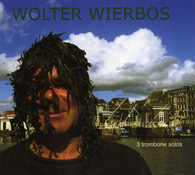Wolter Wierbos
3 Trombone Solos
(DolFijn Records)
With just a few exceptions whose nature obviously lacked the overt conceptual
intentions of what was to come (and let's not forget that the piano
has a different history, OK?), the modern "solo"
practice as a field of exploration of an "autonomous" musical grammar
had its start with the release of the Anthony Braxton album titled For Alto,
back in 1968. For various reasons (in variable quantities, ranging from the
solo practice also becoming acceptable for double bass, percussion, trumpet,
and trombone, to the obvious money factors that in a favourable cultural
framework made it possible for Festival and concert promoters to feature
solo performances) the 70s appeared to embrace the solo.
Nowadays, things are different. While it could be argued that the changing
of languages and the expansion of the performing techniques have made the
solo practice less of a priority for many musicians, it's entirely possible
that (in a situation where money is increasingly scarce) it's the "big
event" framework as an "a priori" for the financial well-being
of any Festival, or series of concerts, that's the main obstacle to the
proliferation of solo concerts.
Putting
general issues aside, I have to confess that the #1 reason for my liking
a lot 3 Trombone Solos (besides the obvious fact that the music featured
on this album is of an excellent quality) is the fact that this is the
first time I've listened to solo Wolter Wierbos. Which is in a way quite
strange, given the many albums I own (just from memory: by groups led by
Maarten Altena, by Alexander von Schlippenbach's Berlin Contemporary Jazz
Orchestra, by The Frank Gratkowski Quartet, also by Misha Mengelberg's
Instant Composers Pool Orchestra) that greatly benefit from his performing
input.
3 Trombone Solos is the album chosen by Wierbos to start his new, personal
label. The liner notes (penned by Wierbos himself) talk of a new maturity
("I try to achieve more with less"), thanks also to his "new" instrument
(a Conn Vocabell built in 1933), more resistant and stubborn: "What
I lost in flexibility I gained in tone quality and projection".
Professionally
active since the end of the 70s, Wierbos rapidly grew in personality, while
at the same time shedding traces of George Lewis and Ray Anderson, while
(besides a few sounds which remind me of Roswell Rudd) trombone players
of the jazz tradition, such as those from the Ellington Orchestra, stayed
(here I see a parallel with Han Bennink). Wierbos sports an easy-to-recognize
sound, prodigious technical skills, and great versatility. Not a natural-born
leader, he's a musician who manages to be himself while serving many diverse,
also quite demanding, leaders.
3 Trombone Solos features three long tracks, very well recorded by Malachi
Ritscher (Chicago), Dylan van der Schyff (Portland), and Micha de Kanter
(Amsterdam) between October, 2005 and August, 2006. Nice dynamics, natural
sound.
Maybe
taking inspiration from the place where it was recorded, Chicago has a
slow start with a definite blues flavour, progressively getting more
"swing" (at times one can almost hear a ride cymbal marking the
time in the background). Then, the plunger, and - starting at about 5' -
something that definitely sounds very Mingus-like. Starting at about 8',
there's a nice episode which almost sounds "ambient" for synthesizer,
Wierbos making great use of multiphonics. Then it's the sound of the breath
inside the instrument, then - starting at about 14' - there's a sound/rhythm
that definitely reminded me of scratching. Towards the end, strange pops
and sounds reminded me of (the late) Lester Bowie's "expanded" trumpet.
Portland
opens with a "drone" with multiphonics progressively growing
in intensity. Starting at about 5' there's a swing climate which seems
to feature a few quotes. There's a slow melodic exploration, getting gradually
agitated. Like in the previous piece, there's a moment (at about 19') where
breathing sounds come to the fore, the piece coming to its close with a
thematic exploration.
Amsterdam
opens with overtones and something that sounds like (but obviously isn't)
a loop, then it's in the trumpet register. Starting at about 4' there's
a cool, swing climate, almost like a pocket-sized big band. There's applause
at 7', then a second part that goes in "parallel": a frenzied
opening section, a loop, melodic playing, then it's "trumpet",
then
"tuba", then a "synth loop"; then it's a fine close,
somewhat mirroring the one from the first part of the track.
Beppe Colli
© Beppe Colli 2009
CloudsandClocks.net | Oct. 10, 2009











